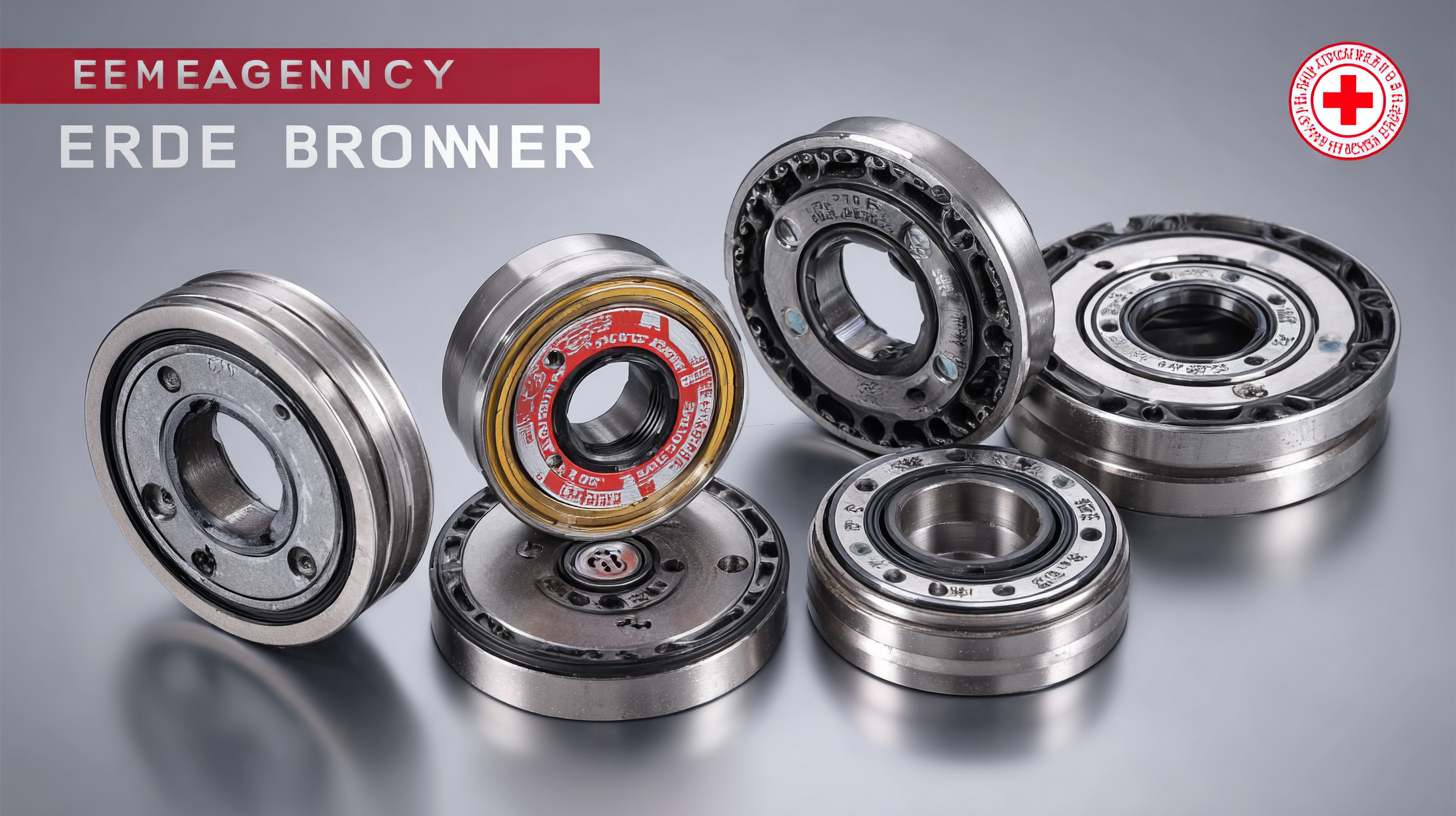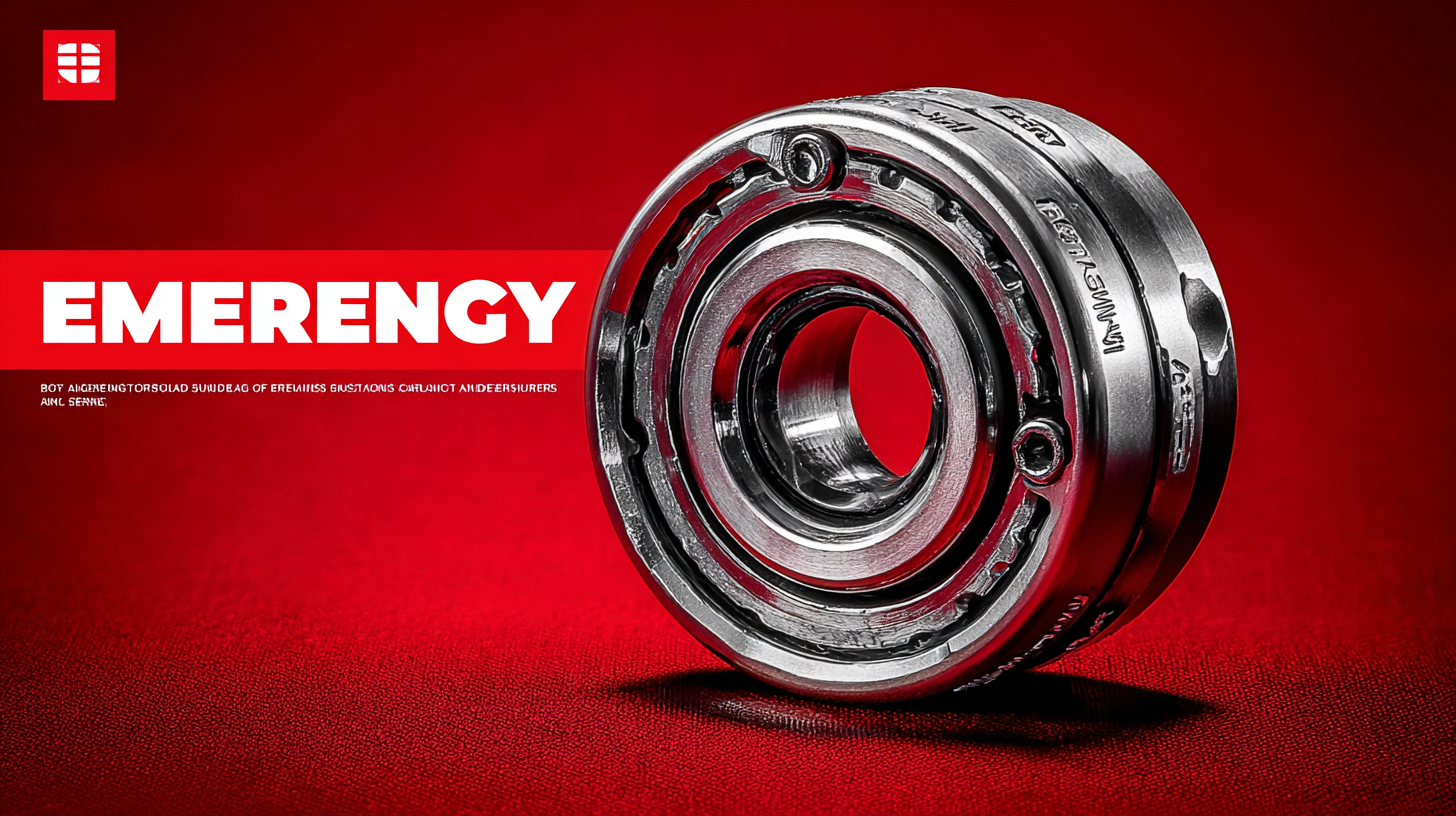Top Industry Standards for Emergency Bearing Order Suppliers and Five Key Reasons to Choose the Best
In the realm of industrial operations, the reliability of machinery is paramount, and the role of an Emergency Bearing Order Supplier cannot be overstated. According to a report by the International Organization for Standardization (ISO), equipment failures can lead to an average loss of $18,000 per hour in manufacturing environments, highlighting the critical need for prompt bearing replacements to minimize downtime. As industries increasingly adopt just-in-time production processes, the demand for top-tier emergency suppliers has surged. Additionally, the World Bearing Association indicates that the global bearing market is expected to reach $600 billion by 2025, underscoring the competitive landscape that emergency suppliers must navigate. In this blog, we will explore the top industry standards that define excellence in emergency bearing supply and outline five compelling reasons why choosing the best supplier can significantly enhance operational efficiency and reduce risk for businesses.

Top Industry Standards in Emergency Bearing Supply Chain Management
In the dynamic landscape of emergency bearing supply chain management, industry standards play a crucial role in ensuring reliability and efficiency. According to a report by the International Organization for Standardization (ISO), adherence to standards like ISO 9001, which focuses on quality management systems, can significantly improve operational performance, with companies often reporting at least a 10% reduction in order fulfillment times. An efficient supply chain not only meets urgent demands but also enhances customer satisfaction, ultimately driving business success.
Moreover, the adoption of advanced technologies within the supply chain, such as real-time tracking systems, has become essential. A study by Deloitte found that organizations leveraging digital supply chain tools experienced up to a 20% increase in inventory turnover rates. This technological integration supports rapid response capabilities, allowing emergency bearing order suppliers to react promptly to unforeseen disruptions, thus minimizing downtime. Implementing these industry standards and technologies not only addresses immediate needs but also positions suppliers for sustained growth and competitive advantage in the market.
Key Performance Metrics for Evaluating Bearing Manufacturers
When evaluating bearing manufacturers, key performance metrics play a crucial role in determining the best suppliers for emergency orders. One of the primary metrics is delivery reliability, which assesses a manufacturer’s ability to meet deadlines consistently. Timely delivery can significantly reduce downtime and ensure that operations continue smoothly, making it vital for industries that rely on quick turnaround times.
Another important metric is product quality, which encompasses the durability and performance of the bearings. High-quality bearings can withstand extreme conditions and minimize the chances of failure, directly impacting operational efficiency. Manufacturers often provide quality certifications and test results, which can help businesses gauge the reliability of their products.
Moreover, customer service is a key performance indicator that reflects a manufacturer’s commitment to client satisfaction. Effective communication, responsiveness to inquiries, and support during emergencies are essential traits. A supplier that prioritizes excellent customer service can foster long-lasting relationships and can be more adaptable in meeting the unique needs of their clients, ensuring that businesses receive the best possible support when urgent situations arise.

Critical Certifications and Quality Control Protocols in the Bearing Industry
In the bearing industry, critical certifications and quality control protocols are essential indicators of a supplier's reliability and professionalism. Companies that meet industry standards such as ISO 9001 or AS9100 demonstrate their commitment to maintaining high-quality processes and products. These certifications assure customers that their bearings have undergone rigorous testing and adhere to strict manufacturing guidelines. Furthermore, suppliers should regularly undergo audits and assessments to ensure compliance with evolving standards, reinforcing their dedication to quality and safety.
When selecting emergency bearing order suppliers, consider looking for those who incorporate advanced quality control systems. For instance, suppliers utilizing statistical process control (SPC) can monitor production processes in real-time, identifying potential deviations before they result in defects. Additionally, organizations adhering to ISO/TS 16949, specifically for the automotive industry, indicate a serious commitment to excellence and continuous improvement.
Tips: Always inquire about a supplier's certification status and ask for quality assessment reports. Engaging suppliers who participate in ongoing training and skill development will not only ensure high-quality products but also enhance your operational efficiency in critical situations.
Top Industry Standards for Emergency Bearing Order Suppliers and Five Key Reasons to Choose the Best - Critical Certifications and Quality Control Protocols in the Bearing Industry
| Certification |
Description |
Importance |
Quality Control Protocol |
Evaluation Frequency |
| ISO 9001 |
Quality Management Systems |
Ensures consistent quality and customer satisfaction |
Process Audits |
Annual |
| ISO 14001 |
Environmental Management Systems |
Encourages sustainable practices |
Environmental Audits |
Annual |
| OHSAS 18001 |
Occupational Health and Safety Management |
Improves workplace safety |
Safety Inspections |
Semi-Annual |
| AS9100 |
Quality Management for Aerospace |
Ensures stringent quality for aerospace components |
Design Reviews |
Annual |
| IATF 16949 |
Quality Management for Automotive Sector |
Focuses on continuous improvement and defect prevention |
Quality Metrics Review |
Annual |
Cost-Benefit Analysis: Why Quality Matters in Emergency Bearing Orders
When it comes to emergency bearing orders, the cost-benefit analysis reveals a critical link between quality and overall expense management. High-quality bearings can significantly reduce the frequency of failures, ultimately leading to lower maintenance costs and minimizing operational downtime. In industries where timely response is vital, investing in reliable emergency bearing suppliers is not just an option but a necessary strategy. A systematic approach ensures that organizations not only uphold safety and efficacy in their operations but also decrease wastage in their budgets.
Moreover, selecting the right supplier goes beyond just immediate financial considerations. The implications of poor-quality bearings can ripple through production processes, affecting everything from equipment performance to compliance with safety regulations. As such, prioritizing suppliers that adhere to recognized industry standards can yield substantial long-term savings. The evidence from various sectors, including healthcare, emphasizes the importance of quality interventions — whether in tools, processes, or products — as they are fundamental to reducing waste and enhancing efficiency. Thus, as firms weigh their options for emergency bearing orders, the principles of quality should undeniably guide their decisions.

Innovative Solutions for Sourcing Bearings Under Pressure: Latest Trends and Insights
In the fast-paced world of manufacturing and logistics, sourcing bearings under pressure has become a critical focus for industry leaders. Recent data from the Bearings Market Report 2023 indicated that the global bearing market is projected to reach $120 billion by 2025, driven by advancements in technology and increased demand for high-performance components. This surge has prompted emergency bearing order suppliers to innovate and adopt new strategies that ensure timely delivery and optimal performance, even in the most challenging conditions.
One of the latest trends is the integration of AI and machine learning in inventory management systems. These technologies not only streamline the ordering process but also enhance predictive analytics, allowing suppliers to anticipate demand fluctuations and maintain optimal stock levels. Furthermore, a 2023 survey by the International Journal of Mechanical Engineering and Technology noted that 78% of manufacturers prefer suppliers that offer real-time tracking of their orders, allowing for greater transparency and reliability in their operations. As the industry evolves, embracing these innovative solutions will be crucial for suppliers looking to maintain a competitive edge while meeting the urgent needs of their clients.
Top Industry Standards for Emergency Bearing Order Suppliers
This bar chart illustrates the compliance rates of different industry standards for emergency bearing order suppliers. It highlights the importance of adhering to these standards to ensure quality and reliability in bearing sourcing under pressure.

Home
Products
Industrial Bearings
Deep Groove Ball Bearings
Self-Aligning Ball Bearings
Angular Contact Ball Bearings
Cylindrical Roller Bearings
Taper Roller Bearings
Spherical Roller Bearings
Bearing housing or Accessories
Miniature Bearing
Thrust ball bearing
Radial Spherical Plain Bearing
Pillow Block Bearing
Needle Roller Bearings
Automotive Bearings
Agricultural Bearings
Special Material Bearings
Industry Application
About Us
News
Contact Us





